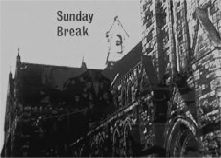
TV Pop Diaries
Pop Music on British Television 1955 -
From the TV Times "The club's music by The Alex Welsh Band and young people from England, Scotland and Wales: a window on their world, and their approach to religion and living.”
The outbreak of violence by Teddy Boys across the UK in the mid-
In early 1958 ABC Television were in talks with social worker and religious adviser
Penry Jones to devise a programme that looked at youth problems from a Christian
perspective. Two pilot shows were produced and shown to clergymen, who were enthusiastic.
An early version of the show, Facing Tomorrow, was to be broadcast by ABC on Sunday
16th February, featuring an interview with Frankie Vaughan, with a set design meant
to recreate a youth club. But the show was awaiting approval from the Central Religious
Advisory Committee, who had approval on religious programming from both the BBC and
ITV. In the end it was not shown, but a re-
A similar youth club setting to the pilot was constructed within a television studio and Sunday Break was launched on the evening of 16th March 1958. The same evening ATV showed an edition of About Religion, which had a Christ figure (played by an anonymous actor), dressed in jeans and a sweat shirt being crucified.
The purpose of the show was to engage young people in discussion about the problems
that they face and why some feel that taking to violence and destruction is a way
out, and if it is then how could Christian teaching help reverse it. Everything from
youth church attendance to pre-
ITV must have had high hopes for the show, giving it the much-
Alex Welsh and his group was replaced by The Dill Jones Trio in 1959 and the show
moved out of the studio in July 1960 following another re-
On 26th March 1961 they broadcast A Man Dies, a folk music interpretation of the crucifixion featuring young people from a Bristol Presbyterian church youth club, and written by Rev Ernest Marvin and Ewan Hooper from Bristol's Old Vic theatre. As noted earlier, a similar take on the theme had been broadcast in 1958, but despite complaints from clergy, members of parliament and the public this new presentation was well received.
Music acts however would be dropped altogether in late 1962.
Joe McGrath was brought in to direct the show in 1962, a few years before he would move onto working with Peter Cook and Dudley Moore, while future film director Mike Hodges also worked on the show as programme editor towards the end of its run.
In summer 1964 the show re-
During the show’s history the stars popping their heads around the door included Paul Anka, Brenda Lee, Marty Wilde and Mark Wynter, but the soundtrack was mostly trad jazz.
The same bored newspaper editors had another plan for the disaffected rockers in
1964 by engaging them in a needless punch-
SUNDAY BREAK
ABC
16th March 1958 -
